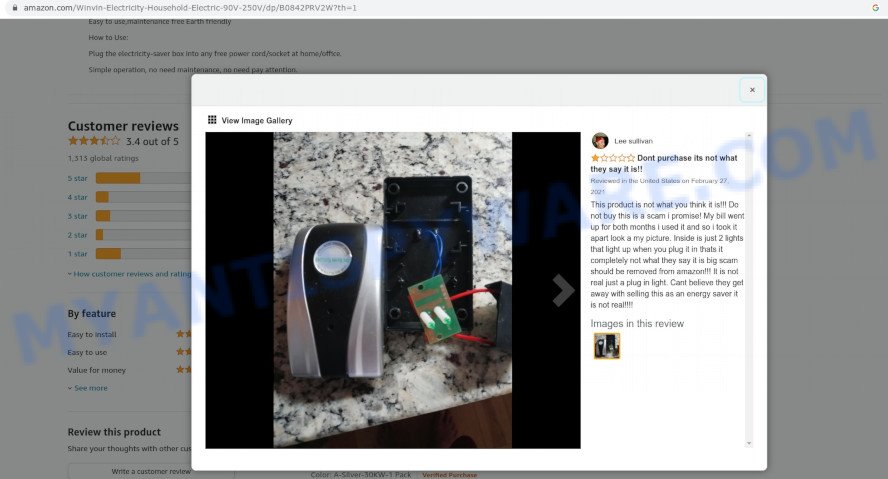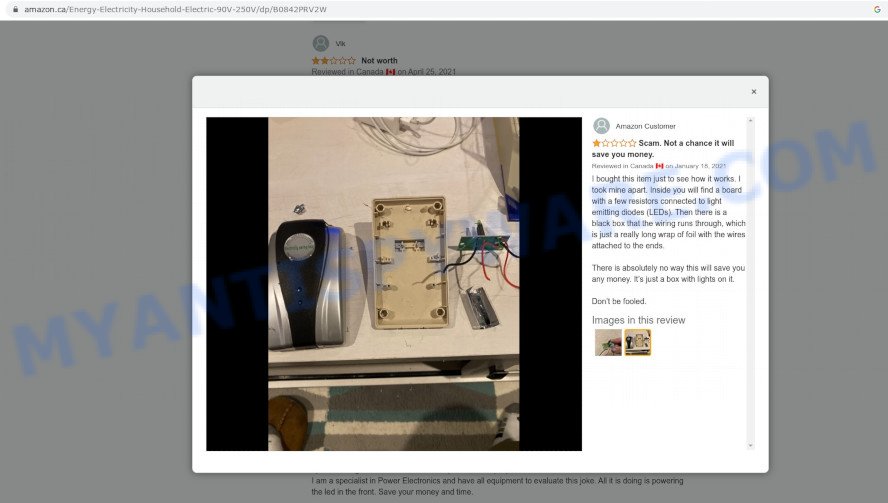Is Pro Power Save a SCAM?
Pro Power Save is a scam that claims to offer consumers a device that can reduce their electricity bills by up to 90%. This scam uses fake advertisements, fake customer reviews, and the name of Elon Musk to make it seem legitimate. However, the device is not real, and consumers who fall for the scam will end up losing their money.

The scammers behind Pro Power Save prey on consumers’ desire to save money on their electricity bills. They claim that the device uses advanced technology to reduce the amount of electricity that appliances and devices use, resulting in huge savings. However, there is no such device, and the scammers simply take consumers’ money and provide nothing in return.
To make matters worse, the scammers behind Pro Power Save use the name of Elon Musk to make their scam seem more legitimate. They claim that Musk has invested in the device and that it is endorsed by him. This is not true, and Musk has spoken out against scams like Pro Power Save that use his name without permission.
Consumers should be wary of any device or service that claims to offer huge savings with little effort or investment. Scams like Pro Power Save are dangerous because they not only rob consumers of their money but also deceive them into thinking they are making a smart investment. It is important to do your research and only invest in products or services that have been proven to work and are legitimate.
QUICK LINKS
- Is Pro Power Save a SCAM?
- Pro Power Save Device Review – Does It Really Work
- How to Spot and Avoid Power Saving Scams
- What To Do if You Were Scammed
Pro Power Save Device Review – Does It Really Work
Pro Power Save is a device that claims to reduce your electricity consumption and save you money on your energy bills. The device is sold online through various websites and is marketed as a high-tech solution to help you save money on your energy bills. However, there are concerns that the device may not work as advertised, and could in fact be a scam.

The Pro Power Save device claims to work by improving the power quality of your electricity supply. It is said to reduce the amount of energy that is wasted by your appliances, and to help them operate more efficiently. However, there is no scientific evidence to support these claims, and some experts have suggested that the device may actually be a scam. In addition, many consumers have reported that the device did not work as advertised, and did not result in any noticeable savings on their energy bills.

If you are considering purchasing a Pro Power Save device, it is important to do your research and be aware of the potential risks. Some websites that sell the device use deceptive marketing techniques, including the use of fake reviews and celebrity endorsements. For example, some sites claim that Elon Musk has endorsed the device, when in fact there is no evidence to support this claim. In the end, it is up to each consumer to decide whether the Pro Power Save device is right for them, but it is important to be aware of the potential risks and to approach the product with a healthy dose of skepticism.

Examples of such scams
Here are some examples of other fake energy-saving devices that have been reported as scams:
- The RealWatt device is another fraudulent energy-saving device that has been marketed to consumers. It is claimed that the device can reduce energy consumption by up to 90%. However, the RealWatt device has been proven to be nothing more than a simple capacitor, which cannot actually reduce energy consumption. The device is often marketed through misleading advertisements and fake customer reviews.
- The Power Factor Saver is a fraudulent device that is marketed as an energy-saving device. It claims to improve the power factor of electrical appliances, leading to a reduction in energy consumption. However, the Power Factor Saver has been proven to be a simple capacitor, which cannot actually improve the power factor of electrical appliances.
- The EcoBox Energy Saver is another fraudulent energy-saving device that has been marketed to consumers. It is claimed that the device can reduce energy consumption by up to 50%. However, the EcoBox Energy Saver has been proven to be a simple capacitor, which cannot actually reduce energy consumption.
- Energy Saver Pro is a fraudulent energy-saving device that claims to reduce energy consumption by up to 90%. However, the device has been proven to be nothing more than a simple capacitor, which cannot actually reduce energy consumption.
- The Electricity Saving Box is a fraudulent energy-saving device that claims to reduce energy consumption by up to 50%. However, the device has been proven to be nothing more than a simple capacitor, which cannot actually reduce energy consumption.
- Fuel Saver Pro is a fraudulent energy-saving device that is marketed to reduce fuel consumption in vehicles. It is claimed that the device can improve fuel economy by up to 35%. However, the Fuel Saver Pro has been proven to be nothing more than a simple resistor, which cannot actually improve fuel economy.
- The Smart Box Energy Saver is another fraudulent energy-saving device that claims to reduce energy consumption by up to 30%. However, the device has been proven to be nothing more than a simple capacitor, which cannot actually reduce energy consumption.
- The EcoWatt device is marketed as an energy-saving device that can reduce energy consumption by up to 90%. However, the device has been proven to be nothing more than a simple capacitor, which cannot actually reduce energy consumption.
- The KVAR Energy Controller is marketed as an energy-saving device that can reduce energy consumption by up to 25%. However, the device has been proven to be nothing more than a simple capacitor, which cannot actually reduce energy consumption.
- The Voltex Power Saver is another fraudulent energy-saving device that is marketed to reduce energy consumption. However, the device has been proven to be nothing more than a simple capacitor, which cannot actually reduce energy consumption.
- The Plug-In-Power Saver is a fraudulent energy-saving device that is marketed to reduce energy consumption. However, the device has been proven to be nothing more than a simple capacitor, which cannot actually reduce energy consumption.
It’s important to remember that there are likely many more similar devices out there, and that consumers should be cautious and do their research before investing in any product that claims to save energy or reduce electricity bills.
How to Spot and Avoid Power Saving Scams

Power-saving scams can be difficult to identify because they often rely on technical-sounding jargon and promise significant energy savings. However, there are some steps you can take to spot and avoid these scams:
- If a device promises to save you an unreasonable amount of energy or money, it is likely a scam. Be cautious of ads that claim you can save up to 90% on your energy bills or offer guarantees of a certain amount of savings.
- Reputable energy-saving devices will have been tested and certified by independent third-party organizations. Look for devices that have received certification from organizations such as ENERGY STAR or Underwriters Laboratories (UL).
- Look for reviews of the product from multiple sources, including independent reviewers and consumer advocacy groups. Be wary of glowing reviews on the product website that may be fake.
- Scammers often use high-pressure tactics, such as limited-time offers or claims that the device is in short supply, to try to force you into making a quick decision. Take your time and do your research before making a purchase.
- Stick to reputable and well-known brands that have a proven track record of producing reliable and effective energy-saving devices. Be wary of devices from unknown or obscure brands that make big promises.
By following these tips, you can reduce your risk of falling victim to power-saving scams and make informed decisions when purchasing energy-saving devices.
What To Do if You Were Scammed
If you believe you have been scammed by a power saving device or any other type of scam, there are a few steps you can take to try and remedy the situation:
Contact the seller or manufacturer
Try to contact the seller or manufacturer of the device to see if you can get a refund or if they can offer any assistance in resolving the issue. However, keep in mind that scammers may not be responsive or may be difficult to track down.
Contact your bank or credit card company
If you paid for the device with a credit card or bank transfer, you may be able to dispute the charge and get your money back.
File a complaint
Consider filing a complaint with your state’s attorney general, the Federal Trade Commission (FTC), or other consumer protection agencies. This can help alert others to the scam and may also prompt an investigation.
Educate others
Help prevent others from falling victim to the same scam by spreading the word and sharing your experience with family and friends.
Finish words
It’s important to be vigilant and do your research before making any purchases, especially when it comes to devices claiming to save energy or money. Remember, if something seems too good to be true, it probably is.

















Beware of fake energy-saving devices that promise to cut your energy bills by 50%. I fell for one of these scams and ended up wasting my money on a useless device. Don’t make the same mistake!
Everybody loves the idea of saving money, can you blame them?
The phony devices described above pander to the wishes of uninformed or uneducated consumers.
It’s next to impossible to stop the people who sell these items. Stopping the sale is a lot like playing Whack-a-Mole.
Don’t be the next victim!
My mother purchased two of the devices by watching a internet video and believing a scammer explaining how to setup the device by placing it (both devices) into the wall sockets closest to where the electrical meter was located outside. The scammer used such jargon to make him appear to be very technical and explained to her the reason why the placement of the product was very important. He explained that the closer the devices were placed to the meter was to catch and reduce electrical spikes that the electric company would allow to be sent to customers as a means of ripping off the customers without their knowledge. This of course is a blatant lie. So after using it for approximately 90 days, she saw no amount of energy savings or reduction of cost in her billing from the electric company. She contacted the seller and was told she could not get all her money back but only 75% of it. She made the purchase using her PayPal account. That was a good decision because PayPal said she would be refunded. Meanwhile the seller told her not to send the devices back to them. So I took one of the so called energy saving units apart and notices it had a fairly good sized capacitor that was connected to one end of the return line of the AC flow and the other connected to a fuse which was connected to a simple circuit board that consisted of two more smaller capacitors, a wafer coil resistor and a green LED to make the unit look like it was properly working. All this 5 pieces of electronic components worth about three dollars were placed inside a white plastic box with one screw securing it closed and a fake UL approved sticker placed over the screw hole to give it that professional technological look of a real energy reducing and saving device.
BEWARE THIS IS A SCAM AND A DEVICE THAT COULD POSSIBLY FAIL AND CAUSE SERIOUS INJURY TO ANYONE WHO PURCHASES THIS DEVICE BELIEVING IT REALLY WORKS AS DESCRIBED. It is a BS scam that is advertised as a high end energy saving cost effective power consumption reducing technological marvel that can make your life wonderful by saving you so much money. “BULL SHIT”
Yep, they got me too. I’m unbelievably gullible but I hope this one finally taught me to do a little research before making a fool out of myself. I agree, the device is “BULLSHIT” and it’s all my bad.
Thank you for letting us know. I was dumb enough this morning to fall for it. I paid by PayPal too, so I am waiting to get this scammer outfit to stop their bs. I was tricked into thinking I could save money after my high electric bill came. No fool like an old fool.
If you paid by Paypal, Paypal has purchase protection from fraud and scams so you may be able to get your money back by claiming “did not receive correct product”. I’ve fallen for a similar scam before where in my case I received a completely different product. You may have to do some back-and-forth communication to convince them that what you received wasn’t correct, but it’s worth a shot. If the seller doesn’t respond to Paypal, then Paypal will usually side on the customer, so there’s a possibility that they just won’t respond.
I’ve since learned to spot warning signs of these types of scams, but they are getting smarter, so a quick search led me to this page.
Their disclaimer best explains the scam! i.e. “SECTION 13 – DISCLAIMER OF WARRANTIES; LIMITATION OF LIABILITY
We do not guarantee, represent or warrant that your use of our service will be uninterrupted, timely, secure or error-free. We do not warrant that the results that may be obtained from the use of the service will be accurate or reliable. You agree that from time to time we may remove the service for indefinite periods of time or cancel the service at any time, without notice to you. You expressly agree that your use of, or inability to use, the service is at your sole risk. The service and all products and services delivered to you through the service are (except as expressly stated by us) provided ‘as is’ and ‘as available’ for your use, without any representation, warranties or conditions of any kind, either express or implied, including all implied warranties or conditions of merchantability, merchantable quality, fitness for a particular purpose, durability, title, and non-infringement. In no case shall Pro Power Save , our directors, officers, employees, affiliates, agents, contractors, interns, suppliers, service providers or licensors be liable for any injury, loss, claim, or any direct, indirect, incidental, punitive, special, or consequential damages of any kind, including, without limitation lost profits, lost revenue, lost savings, loss of data, replacement costs, or any similar damages, whether based in contract, tort (including negligence), strict liability or otherwise, arising from your use of any of the service or any products procured using the service, or for any other claim related in any way to your use of the service or any product, including, but not limited to, any errors or omissions in any content, or any loss or damage of any kind incurred as a result of the use of the service or any content (or product) posted, transmitted, or otherwise made available via the service, even if advised of their possibility. Because some states or jurisdictions do not allow the exclusion or the limitation of liability for consequential or incidental damages, in such states or jurisdictions, our liability shall be limited to the maximum extent permitted by law.
Want to save energy? Put power supplies on your devices that are in sleep mode etc. Sleep mode still takes some power, when we have dozens of these devices on all the time, it adds up to actual wattage. Just flip off the power strip after use…and boom you know it is not drawing power.